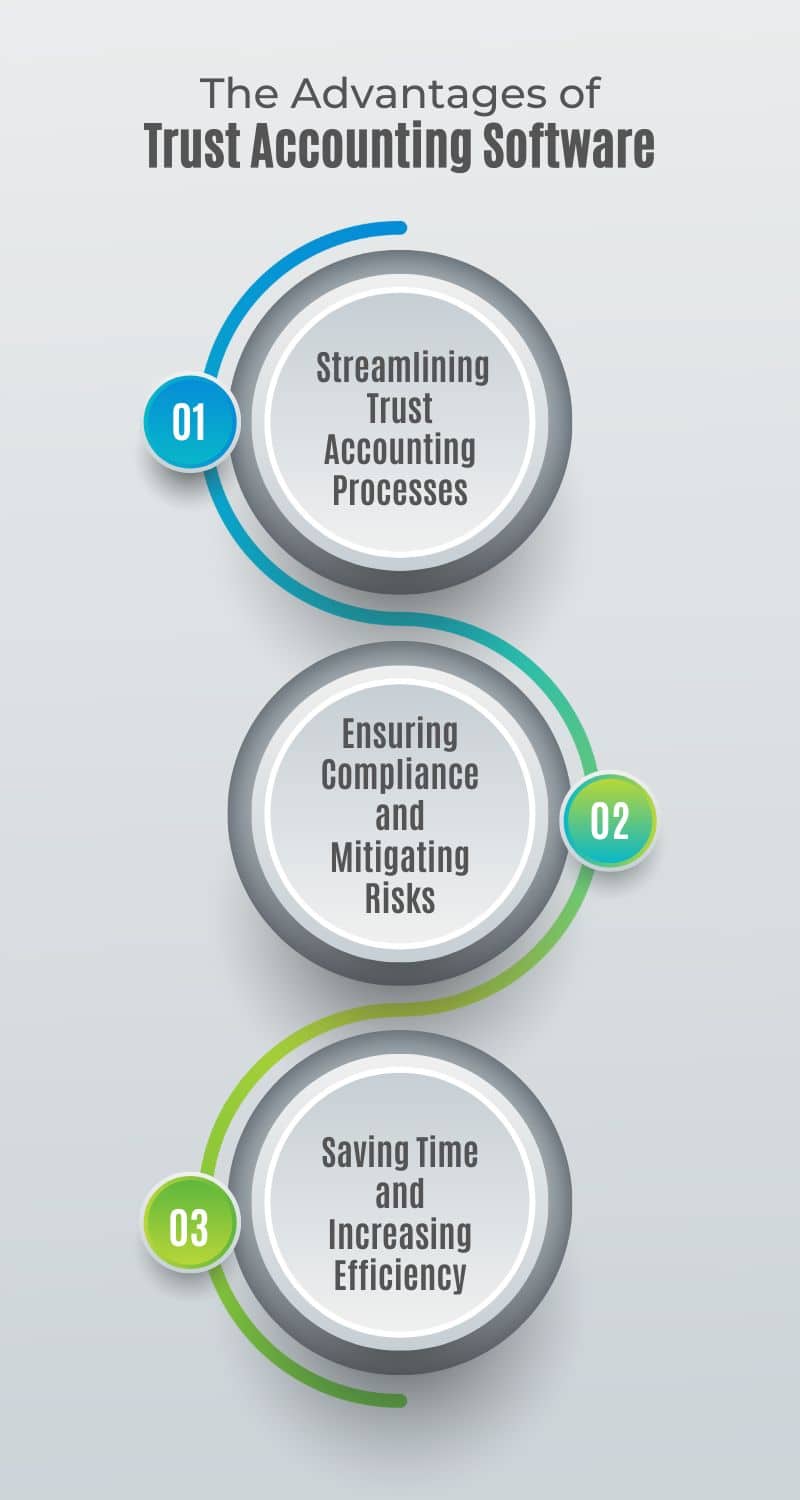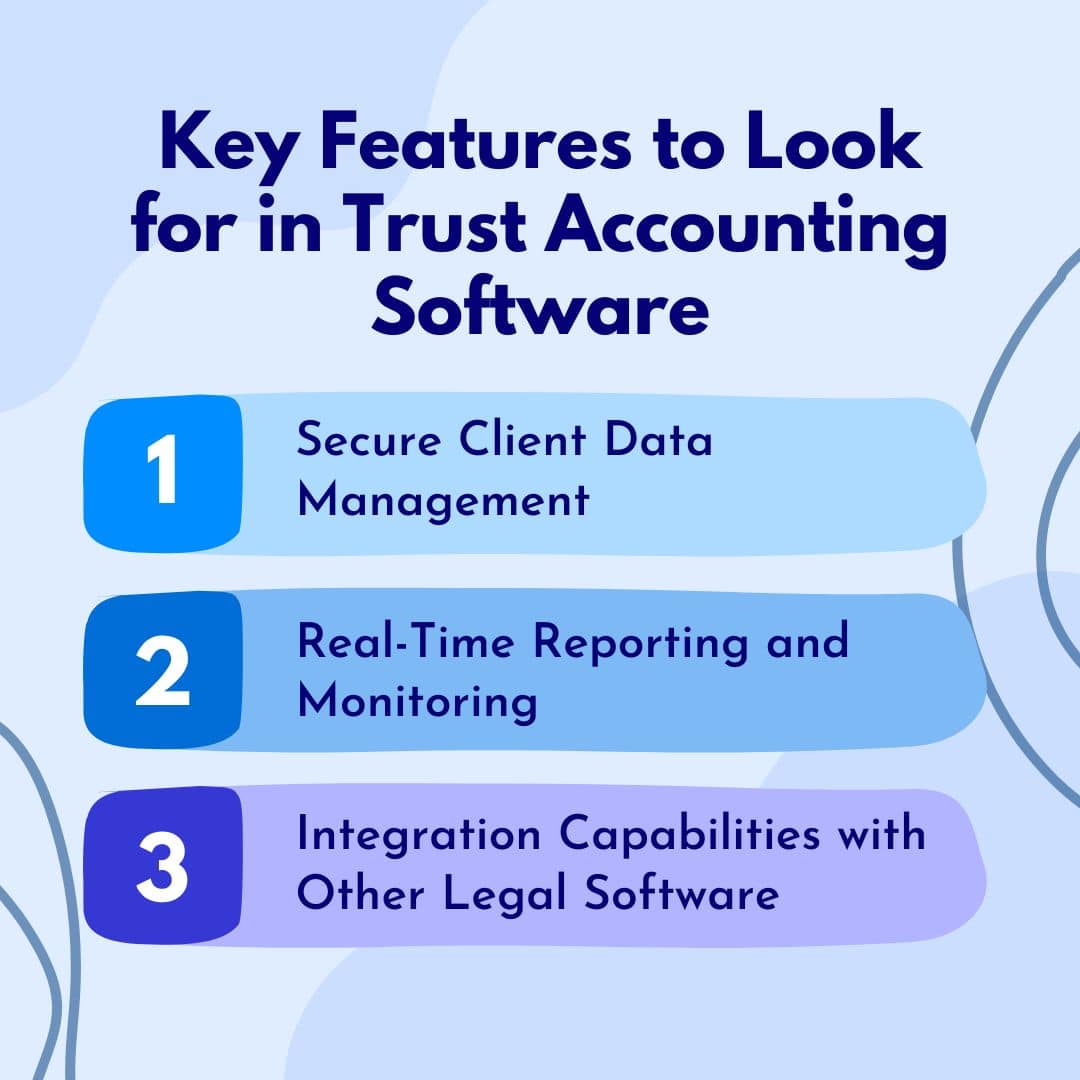Trust Accounting
Trust accounting holds a pivotal position within financial management, particularly in trust oversight. It entails meticulously recording financial transactions to ensure compliance with legal and ethical standards.
Accurately managing trust funds is essential for maintaining beneficiaries’ and stakeholders’ trust and confidence.
Trust Accounting in Legal Practice
Trust accounting is a specialized form of accounting that deals with funds a lawyer or law firm holds on behalf of clients or third parties. These funds may include retainers, settlements, or other monies designated for specific uses.
Unlike regular business accounting, trust accounting must strictly adhere to legal and ethical guidelines to ensure these funds are managed correctly and transparently.

Importance of Trust Accounting for Lawyers and Law Firms
The importance of trust accounting for lawyers and law firms cannot be overstated. At its core, trust accounting safeguards clients’ financial interests, ensuring their funds are available when needed and used solely for their intended purposes. This system of accounting fosters trust between clients and legal professionals, a fundamental element of the attorney-client relationship.
By meticulously tracking and reporting on the handling of client funds, lawyers and law firms demonstrate their commitment to ethical standards and legal compliance, thereby reinforcing their professionalism and integrity.
Moreover, trust accounting serves as a critical protective measure against the commingling of funds. Commingling, or the mixing of client funds with the lawyer’s personal or business funds, is strictly prohibited.
Effective trust accounting helps to prevent this by requiring the maintenance of separate accounts for client funds and the firm’s operating funds. This separation ensures that client monies are not inadvertently used for the firm’s expenses, thereby protecting client interests and promoting transparency in financial dealings.
Risks of Inaccurate Trust Accounting
The risks of inaccurate trust accounting are significant and multifaceted. Financial inaccuracies can lead to a range of consequences, from minor administrative headaches to severe legal and ethical violations.
For instance, errors in trust accounting can result in the misuse of client funds, whether intentional or accidental. Such misuse can erode client trust, damage the firm’s reputation, and lead to disciplinary action by legal oversight bodies.
In severe cases, inaccurate trust accounting can constitute fraud, leading to legal penalties, including fines, restitution, and even disbarment for the responsible attorney.
Furthermore, it can create financial discrepancies that complicate the reconciliation process, potentially leading to financial losses for clients and the firm.
Trust accounting is a cornerstone of ethical legal practice, ensuring the proper management of client funds and maintaining the integrity of the legal profession.
Lawyers and law firms must prioritize accurate trust accounting to protect their clients’ interests, uphold legal and ethical standards, and mitigate the risks associated with financial mismanagement.
Through diligent adherence to trust accounting principles, legal professionals can foster trust, ensure compliance, and safeguard their practice against potential financial and reputational harm.
Challenges Faced in Traditional Trust Accounting Methods
Traditional trust accounting methods, essential to the practice of law, pose several challenges that can impede efficiency, accuracy, and compliance. These challenges primarily arise from manual processes, compliance issues, and the significant time and resources required to maintain meticulous records.
1. Manual Processes and Their Limitations
Inaccuracies in recording receipts or disbursements can lead to significant discrepancies that are difficult to reconcile. Additionally, manual processes often lack real-time updating capabilities, meaning that the financial status of client funds may not be immediately apparent.
This can result in delayed decision-making or, in worst-case scenarios, the unintentional misuse of funds. Moreover, manual record-keeping makes generating timely and accurate financial reports challenging, complicating compliance with legal and regulatory requirements.
2. Compliance Issues and Legal Ramifications
Failure to comply due to oversight or misunderstanding can lead to severe legal ramifications. These may include fines, sanctions, or loss of license.
Traditional methods, which often lack built-in compliance checks, increase the risk of inadvertent violations. For example, ensuring that no overdrafts occur on client trust accounts or that earned fees are promptly transferred from trust accounts can be cumbersome without automated alerts or checks.
3. Time and Resource Drain
The need for meticulous attention to detail means trust accounting can become a full-time job, especially for larger firms or those handling a high volume of trust transactions. This increases operational costs and can lead to delays in other areas of the firm’s operations.
Additionally, the time spent on manual reconciliation and compliance checks is time not spent on strategic activities or client advocacy. While traditional trust accounting methods form the bedrock of client fund management in legal practice, they are fraught with challenges.
The limitations of manual processes, the complexity of compliance issues, and the significant time and resource requirements all underscore the need for modern solutions.
Adopting technology-driven trust accounting systems can help mitigate these challenges, improving accuracy, ensuring compliance, and freeing up valuable resources for higher-value activities.
As the legal industry continues to evolve, embracing these advancements will be crucial for firms aiming to maintain high standards of practice and client service.
The Advantages of Trust Accounting Software
This technology-driven approach addresses many challenges associated with manual trust accounting, revolutionizing how law firms manage client funds.
1. Streamlining Trust Accounting Processes
Trust accounting software automates and streamlines the management of client funds, transforming a complex, error-prone task into a manageable and more reliable process.
Automation reduces the need for manual data entry, minimizing the risk of human error and ensuring that transactions are recorded accurately and promptly. Such software often features intuitive interfaces that simplify the tracking of each client’s funds, making it easier to monitor and manage multiple trust accounts simultaneously.
Real-time updates and digital ledgers provide an up-to-the-minute view of all transactions, ensuring that lawyers and law firm administrators have immediate access to the financial information they need.

2. Ensuring Compliance and Mitigating Risks
One of the most significant advantages of trust accounting software is its ability to help law firms adhere to strict regulatory and ethical standards. These systems are designed with compliance in mind, incorporating features such as automatic reconciliations, alerts for low balances or potential overdrafts, and the separation of earned and unearned fees.
By automating compliance checks, trust accounting software reduces the risk of accidental breaches, which can lead to severe legal ramifications. Furthermore, the ability to generate detailed reports easily supports internal auditing and regulatory inspections, providing clear evidence of proper fund management.
3. Saving Time and Increasing Efficiency
Moreover, the reduced need for manual intervention decreases the likelihood of errors, which in turn lowers the time and resources spent on correcting discrepancies. The cumulative effect of these improvements is a more streamlined, efficient operation that can adapt more quickly to changes in workload or business growth.
The advantages of trust accounting software are clear and compelling. By streamlining trust accounting processes, ensuring compliance and mitigating risks, and saving time while increasing efficiency, this technology offers a powerful tool for law firms.
Its adoption not only enhances the management of client funds but also supports the broader objectives of legal practices by allowing them to focus on delivering high-quality legal services. As the legal landscape becomes increasingly complex, the role of trust accounting software in promoting ethical and efficient practice management will only grow in importance.
Key Features to Look for in Trust Accounting Software
Among these, secure client data management, real-time reporting and monitoring, and integration capabilities with other legal software stand out as essential components that can significantly enhance a law firm’s efficiency and reliability.
1. Secure Client Data Management
The confidentiality and security of client data are paramount in legal practice. Therefore, trust accounting software must offer robust security features to protect sensitive information from unauthorized access, data breaches, and cyber threats.
Data encryption both in transit and at rest, multi-factor authentication, and regular security audits are critical components of secure client data management.
Additionally, the software should comply with relevant data protection regulations, such as the General Data Protection Regulation (GDPR), for firms handling EU citizens’ data to safeguard client information and the firm’s reputation.
2. Real-Time Reporting and Monitoring
Trust accounting software should offer comprehensive reporting and monitoring capabilities that allow for the tracking of individual client funds, the status of overall trust accounts, and detailed transaction histories.
Real-time dashboards that provide an overview of account balances, upcoming transactions, and alerts for discrepancies or compliance issues enhance a law firm’s ability to manage client funds effectively. Such features ensure that firms can quickly respond to irregularities and maintain continuous oversight over all trust account activities.

3. Integration Capabilities with Other Legal Software
In today’s digital environment, trust accounting software’s ability to integrate seamlessly with other legal management tools is invaluable.
Integration with case management systems, billing software, and document management platforms enables a unified and efficient workflow, reducing the need for duplicate data entry and minimizing the risk of errors.
This interoperability facilitates a holistic approach to legal practice management, where trust accounting functions are part of a comprehensive system that includes legal intake, matter management, invoicing, and document management. Such integration streamlines administrative processes and enhances client service by ensuring that all client-related activities are synchronized and up-to-date.
In conclusion, when evaluating trust accounting software, law firms should prioritize secure client data management, real-time reporting and monitoring, and robust integration capabilities with other legal software.
These features are fundamental to managing client funds accurately and securely, ensuring compliance, and optimizing operational efficiency. By focusing on these key features, law firms can select a trust accounting solution that not only meets their current needs but also supports their growth and adapts to the evolving landscape of legal practice.
With the growing emphasis on data security and privacy, your legal billing software will prioritize robust security features and compliance capabilities. Secure encryption, data protection measures, and compliance tools will be essential components of your modern legal billing solutions, ensuring client confidentiality and regulatory compliance.
Looking to Streamline Your Trust Accounting Processes and Mitigate Compliance Risks? AllRize Can Help.
As you’ve learned, trust accounting is the cornerstone of legal practice, ensuring compliance and safeguarding client funds. Yet, traditional methods pose significant challenges: manual processes, compliance risks, and resource drain.
AllRize presents a solution. Our trust accounting software streamlines processes, automates compliance checks, and optimizes efficiency. With features like secure client data management, real-time reporting, and seamless integration, AllRize empowers your firm to excel.
Take the next step towards enhanced trust accounting practices. Schedule a demo with AllRize today and witness firsthand how our software can revolutionize your firm’s operations. Don’t let outdated methods hold you back—embrace the future with AllRize.
